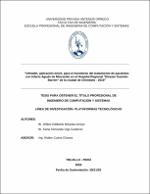InHealth, aplicación móvil, para el monitoreo del tratamiento de pacientes con infarto agudo de miocardio en el Hospital Regional Eleazar Guzmán Barrón de la ciudad de Chimbote - 2019

View/
Download
(application/pdf: 22.55Kb)
(application/pdf: 22.55Kb)
Date
2020Author(s)
Miranda Arroyo, Wilbor Edilberto
Vigo Gutiérrez, Karla Fernanda
Metadata
Show full item recordAbstract
El presente trabajo de investigación, tuvo como objetivo desarrollar una aplicación
móvil denominada “inHealth” basada en HealthKit para el monitoreo del tratamiento
médico tradicional para pacientes con infarto agudo de miocardio en el Hospital
Regional “Eleazar Guzmán Barrón” en el año 2019. Con el fin de lograr el objetivo
trazado, se determinó estudiar los problemas del tratamiento médico actual en la
institución, específicamente, problemas cardiovasculares, mediante 3 entrevistas y 1
encuesta a los interesados, se escogió a 1 médico y 2 pacientes, además se analizaron
los datos recogidos, realizando así la comparación y selección de prioridades para el
desarrollo mediante 24 historias de usuario, se realizó el diseño de la aplicación,
comprendiendo así la realización de las 47 interfaces, 1 sprint backlog y 1 product
backlog, luego de terminar el desarrollo de inHealth basada en HealthKit, se realizaron
las pruebas de validación, se seleccionó y aplicó las pruebas de Caja Negra, que
consistió en 8 escenarios y la de Heurística de Nielsen para medir la usabilidad de la
aplicación, que consistió en el uso de 9 principios para la evaluación de la aplicación,
para así pasar a la segunda fase de la validación, donde se realizó 1 encuesta y 1
entrevista a 30 pacientes del hospital “Eleazar Guzmán Barrón” en el mes de
noviembre, finalmente se desplegó la aplicación para su distribución mediante Test
Flight en el mes de noviembre. Identificando, mediante las pruebas pre y post test, el
aumento de hábitos aprendidos por parte de los pacientes, específicamente un
incremento del 0.60% al 2.20%, se determinó la aceptación del 60% en base a 30
pacientes involucrados, además se verificó que un 56.7% de los pacientes está
conforme con la funcionalidad de la aplicación. Se concluyó que inHealth, aumentó en
un 1.60% el promedio de hábitos aprendidos del paciente en cuanto a su salud. The objective of this research work was to develop a mobile application called
“inHealth““; based on healthkit for the monitoring of traditional medical treatment for
patients with acute myocardial infarction at the Regional Hospital “Eleazar Guzmán
Barrón““; in 2019. In order to achieve the objective, it was determined to study the
problems of current medical treatment in the institution, specifically cardiovascular
problems, by means of 3 interviews and 1 survey to the interested parties, 1 doctor and
2 patients were chosen, in addition the collected data was analyzed, making the
comparison and selection of priorities for development through 24 user histories, the
design of the application was carried out, comprising the realization of 47 interfaces, 1
sprint backlog and 1 product backlog, after finishing the development of inHealth based
on HealthKit, the validation tests were carried out, the Black Box tests were selected
and applied, which consisted of 8 scenarios, and the Nielsen Heuristics test to measure
usability, which consisted of the use of 9 principles for the evaluation of the application,
in order to move on to the second phase of the validation, where 1 survey and 1
interview were carried out with 30 patients from the “Eleazar Guzmán Barrón““; hospital
in the month of November, finally the application was deployed for distribution by
means of Test Flight in the month of November. Identifying, by means of pre and post
tests, the increase of learned habits on the part of the patients, specifically an increase
from 0. 60% to 2. 20%, the acceptance of 60% was determined on the basis of 30
patients involved, in addition it was verified that 56.7% of the patients are satisfied with
the functionality of the application. It was concluded that inHealth increased the
average patient's learned health habits by 1.60%.

